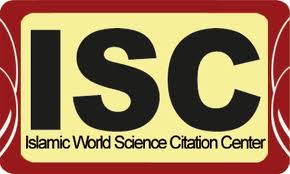INVESTIGATION OF BIOFLOCCULANT AS RENEWABLE DEWATERING AID IN SLUDGE TREATMENT
DOI:
https://doi.org/10.31436/iiumej.v19i1.735Abstract
Sludge treatment is one of the most important and expensive steps in water and wastewater treatment plants. Chemical conditioners such as polyaluminum chloride, aluminum sulfate, Fenton’s reagent, gypsum, and polyacrylamide can produce byproducts that cause health and environmental problems. Moringa oleifera (MO) seeds can be used as a natural alternative to chemical conditioners. The bioactive materials have to be extracted from MO seeds for better performance. In this study, the treatment methods of MO seeds were the bioactive extraction by NaCl (1 M) and oil extraction by hexane solvent, as well as the untreated (crude) seeds powder. Synthetic sludge samples were prepared using kaolin suspension (5% w/v). The most effective coagulant-form was determined based on the values of settling velocity (Vs) and sludge volume index (SVI). Results showed that extraction by NaCl gave the best results of 0.41 cm/min of settling velocity and 63.39 ml/g of SVI. A SVI value greater than 150 ml/g indicates poor settling qualities whereas the control sludge of the current study was 100 ml/g. The most effective coagulant-form was optimized with respect to three process conditions: MO seeds dosage, mixing speed, and contact time. The experiments were designed using 2 Level Factorial-Design by Design-Expert software. The optimum process conditions were seeds dosage of 3246 mg/l, mixing speed of 102 rpm, and mixing time of 29 min. MO seeds can be considered as a natural coagulant that can be used as main sludge conditioner.
ABSTRAK: Rawatan kotoran mendapan adalah salah satu rawatan penting dan termahal dalam merawat air dan sisa kumbahan loji. Perapi kimia seperti poli-aluminium klorida, aluminium sulfida, reagen Fenton, gipsum, dan poli-akrilamida menghasilkan sisa, di mana memberi kesan kepada kesihatan dan alam sekitar. Benih Moringa oleifera (MO) boleh digunakan sebagai bahan ganti semula jadi kepada perapi kimia. Bahan bio-aktif perlu diekstrak daripada benih MO bagi memberi kesan terbaik. Dalam kajian ini, kaedah rawatan menggunakan benih MO adalah dari ekstrak bio-aktif NaCl (1 M) dan ekstrak minyak dari bahan larut hexane, serta serbuk benih tidak dirawat (mentah). Sampel sintetik kotoran mendapan disediakan dengan menggunakan ampaian kaolin (5% w/v). Bentuk kogulan yang paling efektif didapati berdasarkan nilai halaju malar (Vs) dan indeks ketumpatan kotoran mendapan (SVI). Keputusan menunjukkan ekstrak NaCl memberi keputusan terbaik pada halaju malar 0.41 cm/min dan bacaan pada SVI 63.39 ml/g. Nilai SVI lebih besar daripada 150 ml/g menunjukkan kualiti kadaran malar kurang baik berbanding 100 ml/g kajian kawalan semasa kotoran mendapan. Bentuk kogulan yang paling efektif telah dioptimumkan pada tiga keadaan proses: dos benih MO, halaju campuran dan tempoh campuran. Eksperimen dibentuk menggunakan 2 Level Factorial-Design daripada perisian Design-Expert. Keadaan optimum proses adalah pada 3246 mg/l dos benih, 102 rpm halaju campuran, dan tempoh campuran selama 29 min. Benih MO boleh di kategori sebagai kogulan semula jadi dan boleh digunakan sebagai perapi utama bagi kotoran mendapan.
Downloads
Metrics
References
[2] Verlicchi P, Zambello E. (2015) Pharmaceuticals and personal care products in untreated and treated sewage sludge: occurrence and environmental risk in the case of application on soil - A critical review. Sci. Total Environ., 538:750-767.
[3] Abdul Hamid SH, Lananan F, Khatoon H, Jusoh A, Endut A. (2016) A study of coagulating protein of Moringa oleifera in microalgae bio-flocculation. Int. Biodeterior. Biodegrad, 113:310-317.
[4] LeBlanc RJ, Matthews P, Richard RP. (2008) Global atlas of excreta, wastewater sludge, and biosolids management: moving forward the sustainable and welcome uses of a global resource.
[5] Bichi MH. (2013) A review of the applications of Moringa oleifera seeds extract in water treatment. Civ. Environ. Res., 3(8):1-10.
[6] Abdulazeez QM, Jami MS, Alam MZ. (2016) Effective sludge dewatering using Moringa oleifera seed extract combined with aluminium sulfate. J. Eng. Appl. Sci., 11(1):372-381.
[7] Gold M, Dayer P, Faye MCAS, Clair G, Seck A, Niang S, Morgenroth E, Strande L. (2016) Locally produced natural conditioners for dewatering of faecal sludge. Environ. Technol., 37(21):2802-2814.
[8] Kansal SK, Kumari A. (2014) Potential of M. oleifera for the treatment of water and wastewater. Chem. Rev., 114(9):4993-5010.
[9] Hussain J, Jami MS, Muyibi SA. (2012) Enhancement of dewatering properties of kaolin suspension by using cationic polyacrylamide (PAM-C) flocculant and surfactants. Aust. J. Basic Appl. Sci., 6(1):70-73.
[10] Abdulazeez QM, Jami MS, Alam MZ, Iwata M. (2015) Analysis of the efficiency of sludge dewatering using Moringa oleifera as natural phytocoagulant. Int. J. Res. Chem. Metall. Civ. Eng., 2(2):111-117.
[11] Ali EN, Muyibi SA, Salleh HM, Alam MZ, Salleh MRM. (2010) Production of natural coagulant from Moringa oleifera seed for application in treatment of low turbidity water. J. Water Resour. Prot., 2(3):259-266.
[12] Muyibi SA, Alfugara AMS. (2003) Treatment of surface water with Moringa oleifera seed extract and alum- A comparative study using a pilot scale water treatment plant. Intern. J. Environ. Stud., 60(6):617-626.
[13] Yusoff MM, Gordon MH, Ezeh O, Niranjan K. (2016) Aqueous enzymatic extraction of Moringa oleifera oil. Food Chem., 211:400-408.
[14] Okuda T, Baes AU, Nishijima W, Okada M. (1999) Improvement of extraction method of coagulation active components from Moringa oleifera seed. Water Resour., 33(15):3373-3378.
[15] Turovskiĭ IS, Mathai PK. (2006) Wastewater sludge processing. New Jersey: John Wiley & Sons, Inc.






















